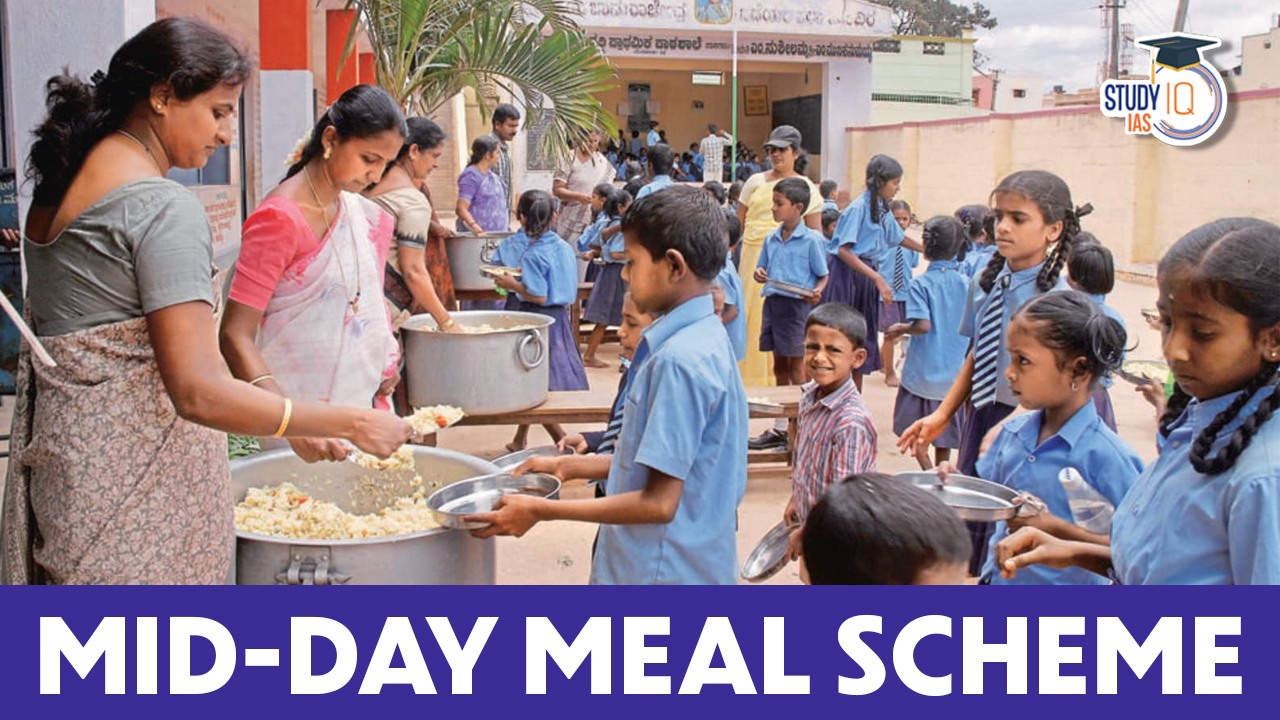Table of Contents
Context: The Maharashtra government has decided to withdraw ₹50 crore in funding for eggs and millet-based sweet dishes in State-run schools under the Mid Day Meal (MDM) Scheme.
About Mid Day Meal Scheme (MDM)
- MDM was launched in 1995 as the National Programme of Nutritional Support to Primary Education (NP-NSPE) & was Renamed as Mid Day Meal (MDM) Scheme in 2001.
- In 2021, MDM was merged into the Pradhan Mantri Poshan Shakti Nirman (PM-POSHAN) Scheme.
Key Features of MDM
- Free-cooked lunch for schoolchildren in Classes 1 to 8 in government and government-aided schools.
- Jointly funded by the Central and State Governments:
- 60% of costs borne by the Union Government
- 40% covered by the State Governments
- Meals must follow nutrition guidelines under the National Food Security Act (2013).
Inclusion of Eggs in MDM Across India
- Eggs are a rich source of protein, vitamins, and minerals.
- 16 States currently serve eggs as part of the Mid Day Meal Scheme.
- States that introduced eggs in MDM have seen improved child nutrition and higher attendance in schools.
| Pradhan Mantri Poshan Shakti Nirman (PM-POSHAN) Scheme |
|
Salient Feature Mid-Day Meal Scheme
It is the largest school lunch initiative in the world and is intended to help primary education become universal. The designated entity for carrying out the plan is the Ministry of Education, formerly the Ministry of Human Resources and Development. Because it is a centrally sponsored programme, costs are split between the federal government and the states. (The center’s share is 60%.)
- The midday meal programme was originally introduced in the state of Tamil Nadu. The midday meal programme was originally introduced in the state of Tamil Nadu.
- When MDMS changed to a cooked midday meal programme in 2001, every eligible kid was given a prepared noon meal for at least 200 days:
| Particulars | Details |
| Energy Intake | 300 calories |
| Protein Intake | 8 to 12 Grams |
- The programme was exclusively intended for public, public-aided, and local body schools up until 2002. Later, the programme was expanded to include students attending Alternative & Innovative Education (AIE) and Education Guarantee Scheme (EGS) institutions.
- 3,479 Educationally Backwards Blocks (EBB) students in classes 6–8 was included in the programme in 2007.
- Each kid has a right to get the number of micronutrients (tablets and deworming medications) specified in the National Rural Health Mission’s school health programme, in addition to calories and food intake.
MDM Rules, 2015
- Under the National Food Security Act (NFSA) 2013, Midday Meal Rules 2015 were published on September 30, 2015.
- By the MDM regulations, schools are permitted to use additional cash for midday meals if MDM funding runs out.
- When schools and other required bodies are unable to serve children hot meals, they are compelled to give recipients food allowances.
- Random monthly testing of meals to be handled by accredited labs.
- According to the MDM guidelines 2015, the state government in question must assign blame to a person or organisation if students at any school go without food for three consecutive school days or five days in a row.
How is the Midday Meal Scheme implemented?
One of the three models is used for its implementation:
- Decentralised model: Local cooks preparing meals on-site, self-help organisations, etc.
- Centralised model: In this arrangement, food is prepared and delivered to the schools by an outside organisation rather than the neighbourhood on-site cooks.
- International Support: Numerous worldwide nonprofit organisations support public schools.


 Mukhyamantri Majhi Ladki Bahin Yojana, O...
Mukhyamantri Majhi Ladki Bahin Yojana, O...
 PM MITRA Parks, Objectives, Key Features...
PM MITRA Parks, Objectives, Key Features...
 Rashtriya Gokul Mission (RGM), Objective...
Rashtriya Gokul Mission (RGM), Objective...

























